Schizophrenia Spectrum Disorder: Development and Progression Essay
VerifiedAdded on 2022/11/25
|5
|1114
|113
Essay
AI Summary
This essay provides a critical evaluation of Schizophrenia Spectrum Disorder, a debilitating form of psychopathology that impacts an individual's educational, occupational, and social functioning. The essay delves into the developmental aspects of the disorder, discussing potential causes such as genetics, pregnancy complications, and stress. It outlines the progression of schizophrenia through prodromal, acute, and recovery phases, highlighting the associated physiological symptoms like hallucinations and disorganized speech, as well as behavioral features such as unhealthy social relationships and emotional blunting. The essay emphasizes the disorder's significant impact on daily life and activities, underscoring the importance of understanding its multifaceted nature to address its catastrophic effects on an individual's life. The provided references support the discussion with relevant research in the field.
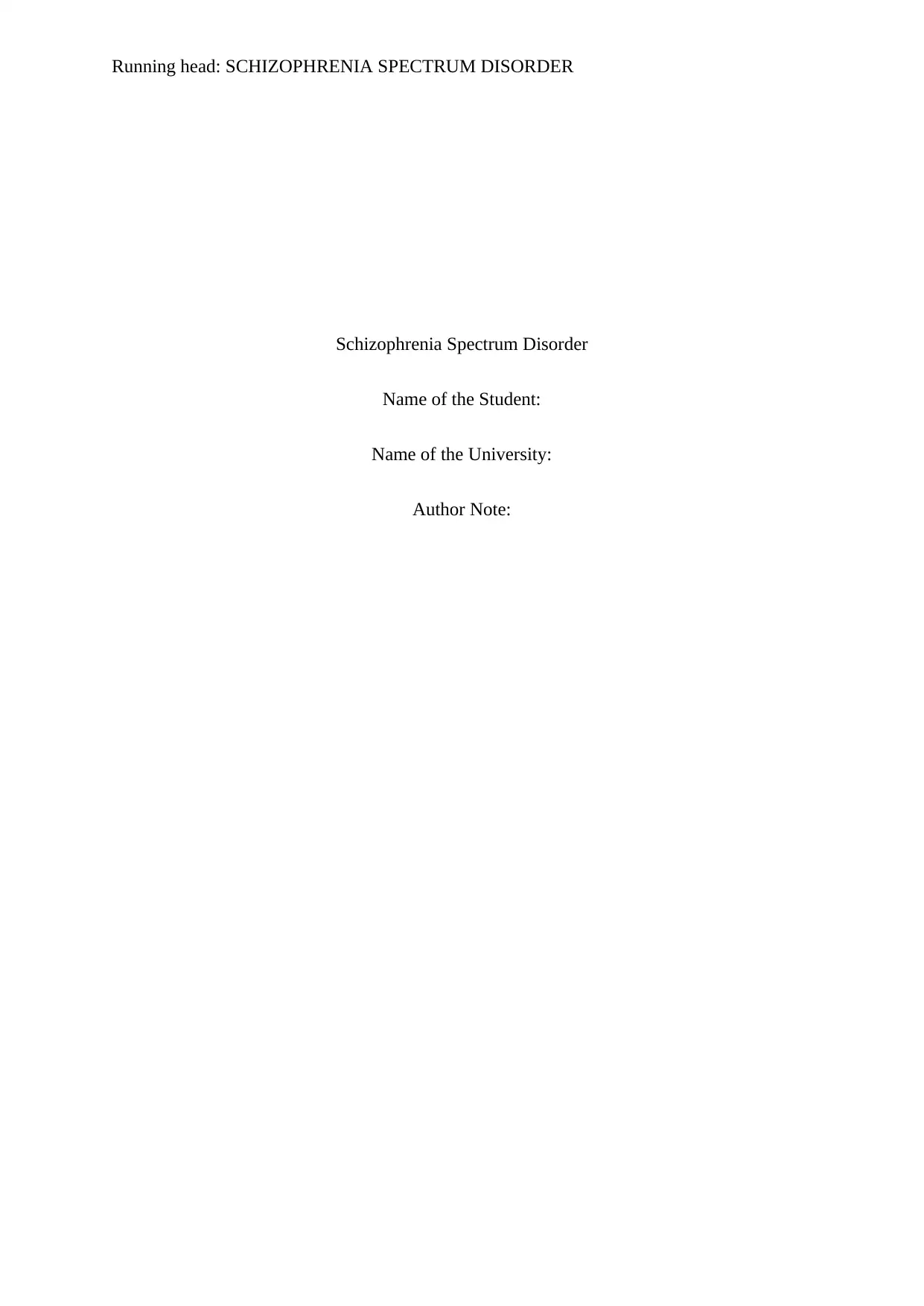
Running head: SCHIZOPHRENIA SPECTRUM DISORDER
Schizophrenia Spectrum Disorder
Name of the Student:
Name of the University:
Author Note:
Schizophrenia Spectrum Disorder
Name of the Student:
Name of the University:
Author Note:
Paraphrase This Document
Need a fresh take? Get an instant paraphrase of this document with our AI Paraphraser
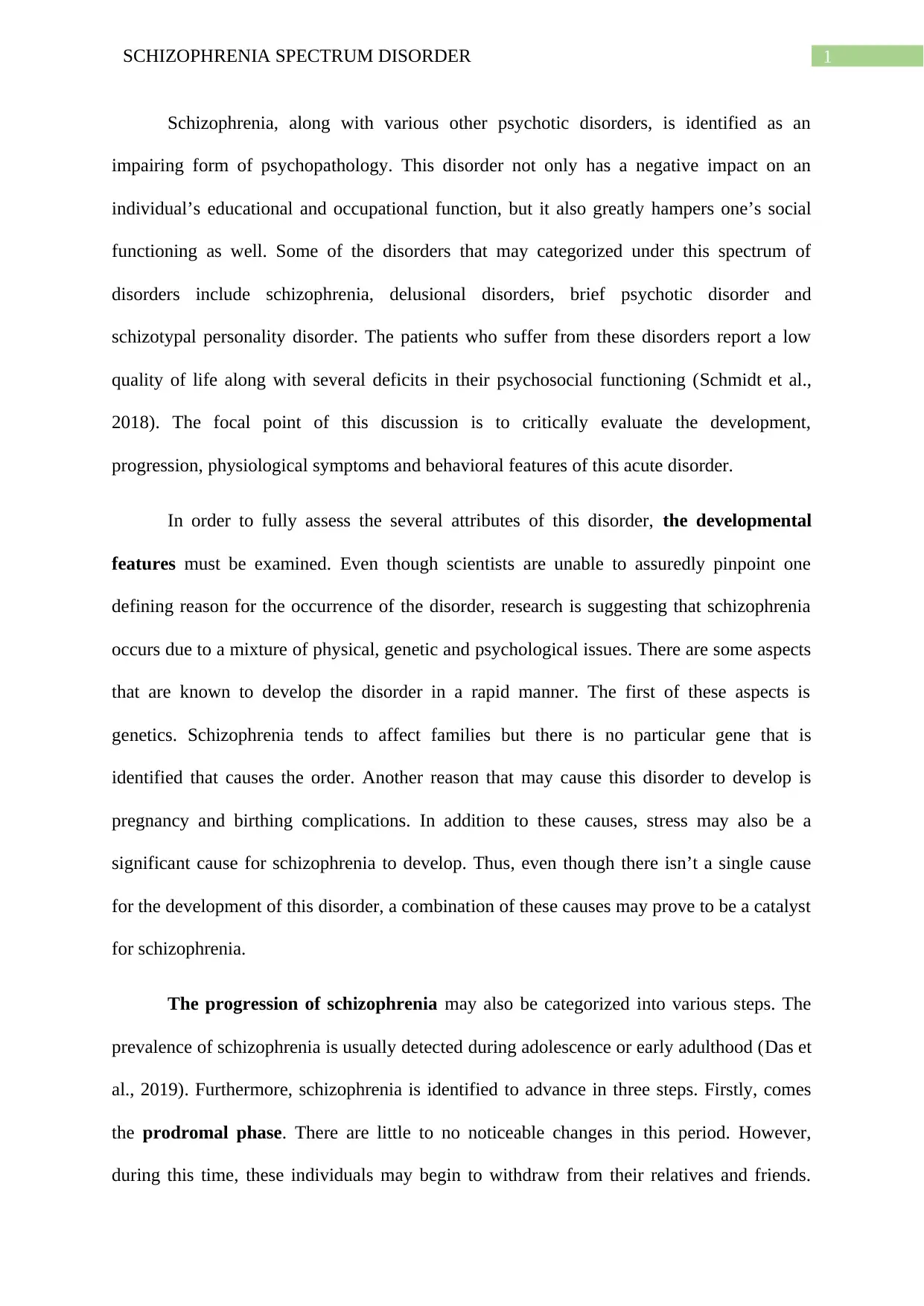
1SCHIZOPHRENIA SPECTRUM DISORDER
Schizophrenia, along with various other psychotic disorders, is identified as an
impairing form of psychopathology. This disorder not only has a negative impact on an
individual’s educational and occupational function, but it also greatly hampers one’s social
functioning as well. Some of the disorders that may categorized under this spectrum of
disorders include schizophrenia, delusional disorders, brief psychotic disorder and
schizotypal personality disorder. The patients who suffer from these disorders report a low
quality of life along with several deficits in their psychosocial functioning (Schmidt et al.,
2018). The focal point of this discussion is to critically evaluate the development,
progression, physiological symptoms and behavioral features of this acute disorder.
In order to fully assess the several attributes of this disorder, the developmental
features must be examined. Even though scientists are unable to assuredly pinpoint one
defining reason for the occurrence of the disorder, research is suggesting that schizophrenia
occurs due to a mixture of physical, genetic and psychological issues. There are some aspects
that are known to develop the disorder in a rapid manner. The first of these aspects is
genetics. Schizophrenia tends to affect families but there is no particular gene that is
identified that causes the order. Another reason that may cause this disorder to develop is
pregnancy and birthing complications. In addition to these causes, stress may also be a
significant cause for schizophrenia to develop. Thus, even though there isn’t a single cause
for the development of this disorder, a combination of these causes may prove to be a catalyst
for schizophrenia.
The progression of schizophrenia may also be categorized into various steps. The
prevalence of schizophrenia is usually detected during adolescence or early adulthood (Das et
al., 2019). Furthermore, schizophrenia is identified to advance in three steps. Firstly, comes
the prodromal phase. There are little to no noticeable changes in this period. However,
during this time, these individuals may begin to withdraw from their relatives and friends.
Schizophrenia, along with various other psychotic disorders, is identified as an
impairing form of psychopathology. This disorder not only has a negative impact on an
individual’s educational and occupational function, but it also greatly hampers one’s social
functioning as well. Some of the disorders that may categorized under this spectrum of
disorders include schizophrenia, delusional disorders, brief psychotic disorder and
schizotypal personality disorder. The patients who suffer from these disorders report a low
quality of life along with several deficits in their psychosocial functioning (Schmidt et al.,
2018). The focal point of this discussion is to critically evaluate the development,
progression, physiological symptoms and behavioral features of this acute disorder.
In order to fully assess the several attributes of this disorder, the developmental
features must be examined. Even though scientists are unable to assuredly pinpoint one
defining reason for the occurrence of the disorder, research is suggesting that schizophrenia
occurs due to a mixture of physical, genetic and psychological issues. There are some aspects
that are known to develop the disorder in a rapid manner. The first of these aspects is
genetics. Schizophrenia tends to affect families but there is no particular gene that is
identified that causes the order. Another reason that may cause this disorder to develop is
pregnancy and birthing complications. In addition to these causes, stress may also be a
significant cause for schizophrenia to develop. Thus, even though there isn’t a single cause
for the development of this disorder, a combination of these causes may prove to be a catalyst
for schizophrenia.
The progression of schizophrenia may also be categorized into various steps. The
prevalence of schizophrenia is usually detected during adolescence or early adulthood (Das et
al., 2019). Furthermore, schizophrenia is identified to advance in three steps. Firstly, comes
the prodromal phase. There are little to no noticeable changes in this period. However,
during this time, these individuals may begin to withdraw from their relatives and friends.
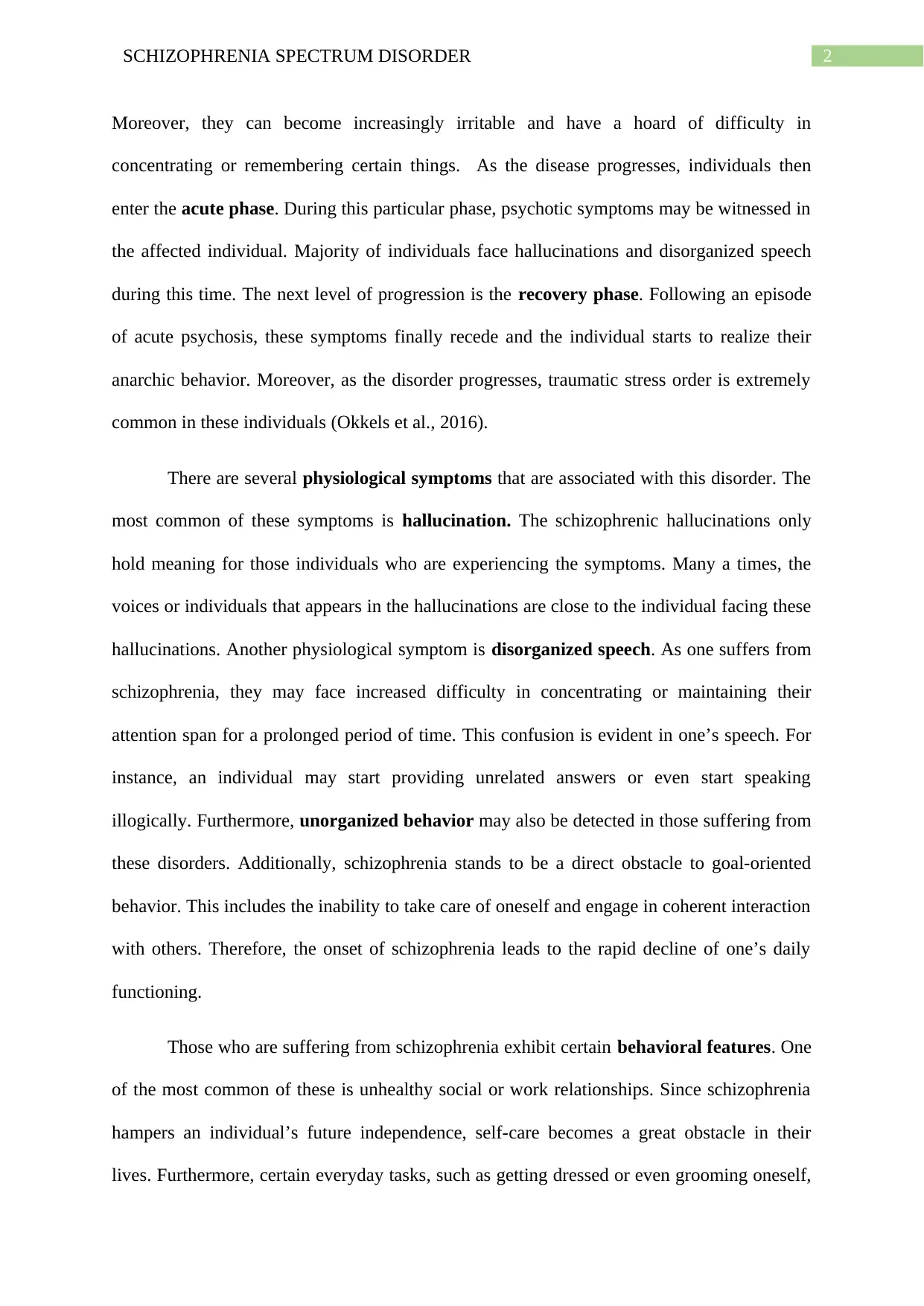
2SCHIZOPHRENIA SPECTRUM DISORDER
Moreover, they can become increasingly irritable and have a hoard of difficulty in
concentrating or remembering certain things. As the disease progresses, individuals then
enter the acute phase. During this particular phase, psychotic symptoms may be witnessed in
the affected individual. Majority of individuals face hallucinations and disorganized speech
during this time. The next level of progression is the recovery phase. Following an episode
of acute psychosis, these symptoms finally recede and the individual starts to realize their
anarchic behavior. Moreover, as the disorder progresses, traumatic stress order is extremely
common in these individuals (Okkels et al., 2016).
There are several physiological symptoms that are associated with this disorder. The
most common of these symptoms is hallucination. The schizophrenic hallucinations only
hold meaning for those individuals who are experiencing the symptoms. Many a times, the
voices or individuals that appears in the hallucinations are close to the individual facing these
hallucinations. Another physiological symptom is disorganized speech. As one suffers from
schizophrenia, they may face increased difficulty in concentrating or maintaining their
attention span for a prolonged period of time. This confusion is evident in one’s speech. For
instance, an individual may start providing unrelated answers or even start speaking
illogically. Furthermore, unorganized behavior may also be detected in those suffering from
these disorders. Additionally, schizophrenia stands to be a direct obstacle to goal-oriented
behavior. This includes the inability to take care of oneself and engage in coherent interaction
with others. Therefore, the onset of schizophrenia leads to the rapid decline of one’s daily
functioning.
Those who are suffering from schizophrenia exhibit certain behavioral features. One
of the most common of these is unhealthy social or work relationships. Since schizophrenia
hampers an individual’s future independence, self-care becomes a great obstacle in their
lives. Furthermore, certain everyday tasks, such as getting dressed or even grooming oneself,
Moreover, they can become increasingly irritable and have a hoard of difficulty in
concentrating or remembering certain things. As the disease progresses, individuals then
enter the acute phase. During this particular phase, psychotic symptoms may be witnessed in
the affected individual. Majority of individuals face hallucinations and disorganized speech
during this time. The next level of progression is the recovery phase. Following an episode
of acute psychosis, these symptoms finally recede and the individual starts to realize their
anarchic behavior. Moreover, as the disorder progresses, traumatic stress order is extremely
common in these individuals (Okkels et al., 2016).
There are several physiological symptoms that are associated with this disorder. The
most common of these symptoms is hallucination. The schizophrenic hallucinations only
hold meaning for those individuals who are experiencing the symptoms. Many a times, the
voices or individuals that appears in the hallucinations are close to the individual facing these
hallucinations. Another physiological symptom is disorganized speech. As one suffers from
schizophrenia, they may face increased difficulty in concentrating or maintaining their
attention span for a prolonged period of time. This confusion is evident in one’s speech. For
instance, an individual may start providing unrelated answers or even start speaking
illogically. Furthermore, unorganized behavior may also be detected in those suffering from
these disorders. Additionally, schizophrenia stands to be a direct obstacle to goal-oriented
behavior. This includes the inability to take care of oneself and engage in coherent interaction
with others. Therefore, the onset of schizophrenia leads to the rapid decline of one’s daily
functioning.
Those who are suffering from schizophrenia exhibit certain behavioral features. One
of the most common of these is unhealthy social or work relationships. Since schizophrenia
hampers an individual’s future independence, self-care becomes a great obstacle in their
lives. Furthermore, certain everyday tasks, such as getting dressed or even grooming oneself,
⊘ This is a preview!⊘
Do you want full access?
Subscribe today to unlock all pages.

Trusted by 1+ million students worldwide
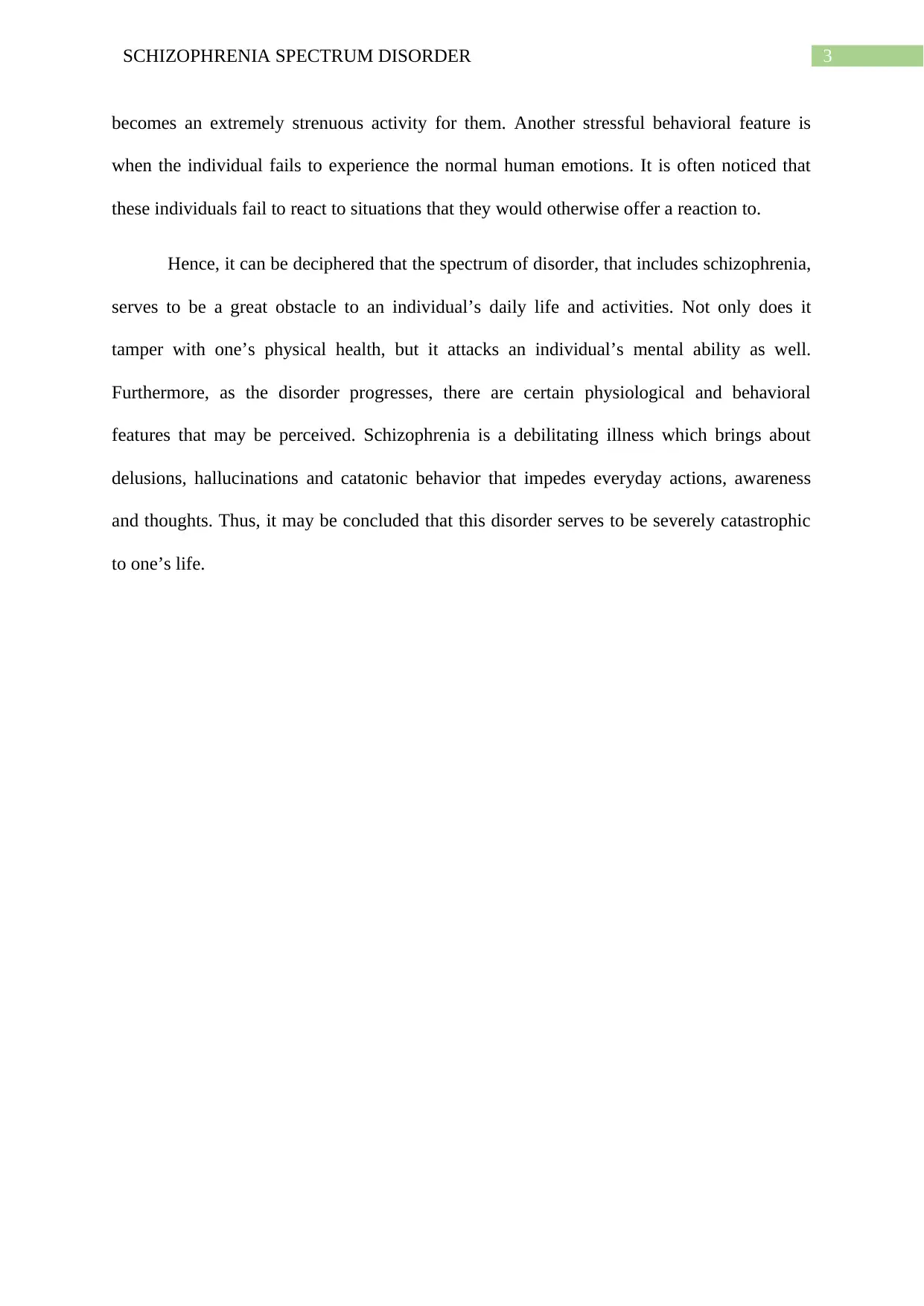
3SCHIZOPHRENIA SPECTRUM DISORDER
becomes an extremely strenuous activity for them. Another stressful behavioral feature is
when the individual fails to experience the normal human emotions. It is often noticed that
these individuals fail to react to situations that they would otherwise offer a reaction to.
Hence, it can be deciphered that the spectrum of disorder, that includes schizophrenia,
serves to be a great obstacle to an individual’s daily life and activities. Not only does it
tamper with one’s physical health, but it attacks an individual’s mental ability as well.
Furthermore, as the disorder progresses, there are certain physiological and behavioral
features that may be perceived. Schizophrenia is a debilitating illness which brings about
delusions, hallucinations and catatonic behavior that impedes everyday actions, awareness
and thoughts. Thus, it may be concluded that this disorder serves to be severely catastrophic
to one’s life.
becomes an extremely strenuous activity for them. Another stressful behavioral feature is
when the individual fails to experience the normal human emotions. It is often noticed that
these individuals fail to react to situations that they would otherwise offer a reaction to.
Hence, it can be deciphered that the spectrum of disorder, that includes schizophrenia,
serves to be a great obstacle to an individual’s daily life and activities. Not only does it
tamper with one’s physical health, but it attacks an individual’s mental ability as well.
Furthermore, as the disorder progresses, there are certain physiological and behavioral
features that may be perceived. Schizophrenia is a debilitating illness which brings about
delusions, hallucinations and catatonic behavior that impedes everyday actions, awareness
and thoughts. Thus, it may be concluded that this disorder serves to be severely catastrophic
to one’s life.
Paraphrase This Document
Need a fresh take? Get an instant paraphrase of this document with our AI Paraphraser
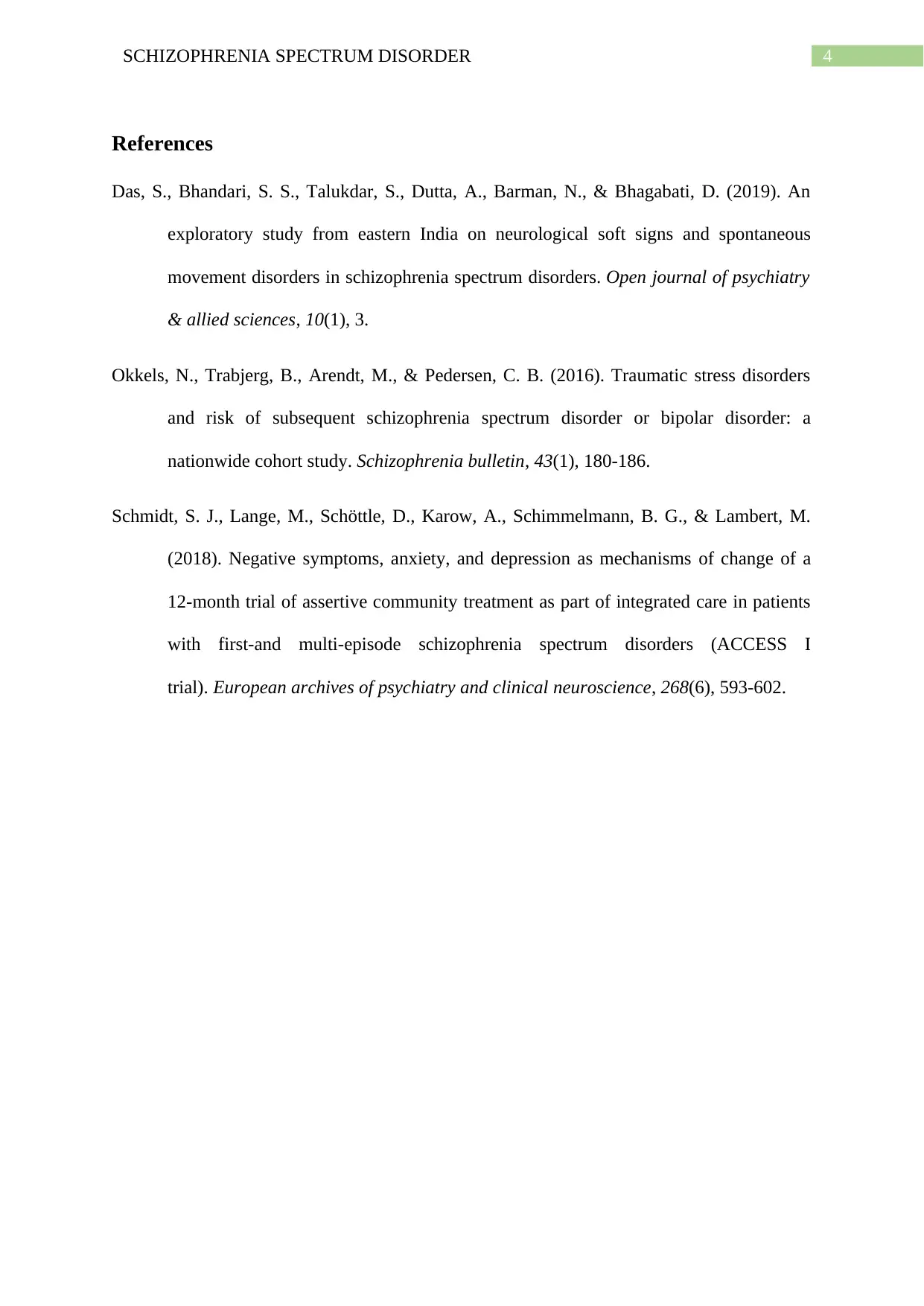
4SCHIZOPHRENIA SPECTRUM DISORDER
References
Das, S., Bhandari, S. S., Talukdar, S., Dutta, A., Barman, N., & Bhagabati, D. (2019). An
exploratory study from eastern India on neurological soft signs and spontaneous
movement disorders in schizophrenia spectrum disorders. Open journal of psychiatry
& allied sciences, 10(1), 3.
Okkels, N., Trabjerg, B., Arendt, M., & Pedersen, C. B. (2016). Traumatic stress disorders
and risk of subsequent schizophrenia spectrum disorder or bipolar disorder: a
nationwide cohort study. Schizophrenia bulletin, 43(1), 180-186.
Schmidt, S. J., Lange, M., Schöttle, D., Karow, A., Schimmelmann, B. G., & Lambert, M.
(2018). Negative symptoms, anxiety, and depression as mechanisms of change of a
12-month trial of assertive community treatment as part of integrated care in patients
with first-and multi-episode schizophrenia spectrum disorders (ACCESS I
trial). European archives of psychiatry and clinical neuroscience, 268(6), 593-602.
References
Das, S., Bhandari, S. S., Talukdar, S., Dutta, A., Barman, N., & Bhagabati, D. (2019). An
exploratory study from eastern India on neurological soft signs and spontaneous
movement disorders in schizophrenia spectrum disorders. Open journal of psychiatry
& allied sciences, 10(1), 3.
Okkels, N., Trabjerg, B., Arendt, M., & Pedersen, C. B. (2016). Traumatic stress disorders
and risk of subsequent schizophrenia spectrum disorder or bipolar disorder: a
nationwide cohort study. Schizophrenia bulletin, 43(1), 180-186.
Schmidt, S. J., Lange, M., Schöttle, D., Karow, A., Schimmelmann, B. G., & Lambert, M.
(2018). Negative symptoms, anxiety, and depression as mechanisms of change of a
12-month trial of assertive community treatment as part of integrated care in patients
with first-and multi-episode schizophrenia spectrum disorders (ACCESS I
trial). European archives of psychiatry and clinical neuroscience, 268(6), 593-602.
1 out of 5
Related Documents
Your All-in-One AI-Powered Toolkit for Academic Success.
+13062052269
info@desklib.com
Available 24*7 on WhatsApp / Email
![[object Object]](/_next/static/media/star-bottom.7253800d.svg)
Unlock your academic potential
Copyright © 2020–2026 A2Z Services. All Rights Reserved. Developed and managed by ZUCOL.




